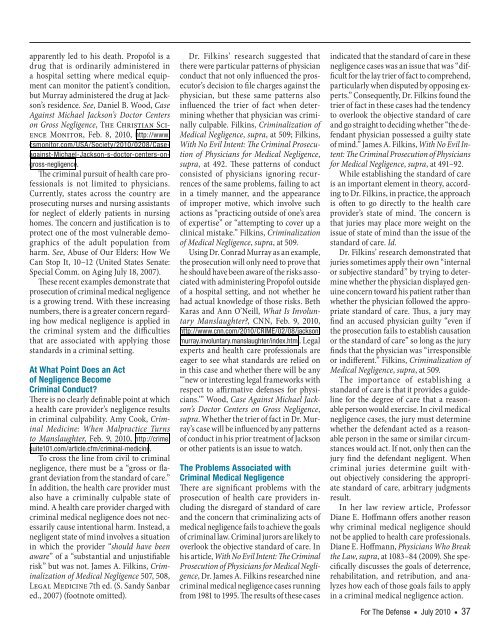For The Defense, July 2010 - DRI Today
For The Defense, July 2010 - DRI Today
For The Defense, July 2010 - DRI Today
- No tags were found...
Create successful ePaper yourself
Turn your PDF publications into a flip-book with our unique Google optimized e-Paper software.
apparently led to his death. Propofol is adrug that is ordinarily administered ina hospital setting where medical equipmentcan monitor the patient’s condition,but Murray administered the drug at Jackson’sresidence. See, Daniel B. Wood, CaseAgainst Michael Jackson’s Doctor Centerson Gross Negligence, <strong>The</strong> Christian ScienceMonitor, Feb. 8, <strong>2010</strong>, http://www.csmonitor.com/USA/Society/<strong>2010</strong>/0208/Caseagainst-Michael-Jackson-s-doctor-centers-ongross-negligence.<strong>The</strong> criminal pursuit of health care professionalsis not limited to physicians.Currently, states across the country areprosecuting nurses and nursing assistantsfor neglect of elderly patients in nursinghomes. <strong>The</strong> concern and justification is toprotect one of the most vulnerable demographicsof the adult population fromharm. See, Abuse of Our Elders: How WeCan Stop It, 10–12 (United States Senate:Special Comm. on Aging <strong>July</strong> 18, 2007).<strong>The</strong>se recent examples demonstrate thatprosecution of criminal medical negligenceis a growing trend. With these increasingnumbers, there is a greater concern regardinghow medical negligence is applied inthe criminal system and the difficultiesthat are associated with applying thosestandards in a criminal setting.At What Point Does an Actof Negligence BecomeCriminal Conduct?<strong>The</strong>re is no clearly definable point at whicha health care provider’s negligence resultsin criminal culpability. Amy Cook, CriminalMedicine: When Malpractice Turnsto Manslaughter, Feb. 9, <strong>2010</strong>, http://crime.suite101.com/article.cfm/criminal-medicine.To cross the line from civil to criminalnegligence, there must be a “gross or flagrantdeviation from the standard of care.”In addition, the health care provider mustalso have a criminally culpable state ofmind. A health care provider charged withcriminal medical negligence does not necessarilycause intentional harm. Instead, anegligent state of mind involves a situationin which the provider “should have beenaware” of a “substantial and unjustifiablerisk” but was not. James A. Filkins, Criminalizationof Medical Negligence 507, 508,Legal Medicine 7th ed. (S. Sandy Sanbared., 2007) (footnote omitted).Dr. Filkins’ research suggested thatthere were particular patterns of physicianconduct that not only influenced the prosecutor’sdecision to file charges against thephysician, but these same patterns alsoinfluenced the trier of fact when determiningwhether that physician was criminallyculpable. Filkins, Criminalization ofMedical Negligence, supra, at 509; Filkins,With No Evil Intent: <strong>The</strong> Criminal Prosecutionof Physicians for Medical Negligence,supra, at 492. <strong>The</strong>se patterns of conductconsisted of physicians ignoring recurrencesof the same problems, failing to actin a timely manner, and the appearanceof improper motive, which involve suchactions as “practicing outside of one’s areaof expertise” or “attempting to cover up aclinical mistake.” Filkins, Criminalizationof Medical Negligence, supra, at 509.Using Dr. Conrad Murray as an example,the prosecution will only need to prove thathe should have been aware of the risks associatedwith administering Propofol outsideof a hospital setting, and not whether hehad actual knowledge of those risks. BethKaras and Ann O’Neill, What Is InvoluntaryManslaughter?, CNN, Feb. 9, <strong>2010</strong>,http://www.cnn.com/<strong>2010</strong>/CRIME/02/08/jackson.murray.involuntary.manslaughter/index.html. Legalexperts and health care professionals areeager to see what standards are relied onin this case and whether there will be any“‘new or interesting legal frameworks withrespect to affirmative defenses for physicians.’”Wood, Case Against Michael Jackson’sDoctor Centers on Gross Negligence,supra. Whether the trier of fact in Dr. Murray’scase will be influenced by any patternsof conduct in his prior treatment of Jacksonor other patients is an issue to watch.<strong>The</strong> Problems Associated withCriminal Medical Negligence<strong>The</strong>re are significant problems with theprosecution of health care providers includingthe disregard of standard of careand the concern that criminalizing acts ofmedical negligence fails to achieve the goalsof criminal law. Criminal jurors are likely tooverlook the objective standard of care. Inhis article, With No Evil Intent: <strong>The</strong> CriminalProsecution of Physicians for Medical Negligence,Dr. James A. Filkins researched ninecriminal medical negligence cases runningfrom 1981 to 1995. <strong>The</strong> results of these casesindicated that the standard of care in thesenegligence cases was an issue that was “difficultfor the lay trier of fact to comprehend,particularly when disputed by opposing experts.”Consequently, Dr. Filkins found thetrier of fact in these cases had the tendencyto overlook the objective standard of careand go straight to deciding whether “the defendantphysician possessed a guilty stateof mind.” James A. Filkins, With No Evil Intent:<strong>The</strong> Criminal Prosecution of Physiciansfor Medical Negligence, supra, at 491–92.While establishing the standard of careis an important element in theory, accordingto Dr. Filkins, in practice, the approachis often to go directly to the health careprovider’s state of mind. <strong>The</strong> concern isthat juries may place more weight on theissue of state of mind than the issue of thestandard of care. Id.Dr. Filkins’ research demonstrated thatjuries sometimes apply their own “internalor subjective standard” by trying to determinewhether the physician displayed genuineconcern toward his patient rather thanwhether the physician followed the appropriatestandard of care. Thus, a jury mayfind an accused physician guilty “even ifthe prosecution fails to establish causationor the standard of care” so long as the juryfinds that the physician was “irresponsibleor indifferent.” Filkins, Criminalization ofMedical Negligence, supra, at 509.<strong>The</strong> importance of establishing astandard of care is that it provides a guidelinefor the degree of care that a reasonableperson would exercise. In civil medicalnegligence cases, the jury must determinewhether the defendant acted as a reasonableperson in the same or similar circumstanceswould act. If not, only then can thejury find the defendant negligent. Whencriminal juries determine guilt withoutobjectively considering the appropriatestandard of care, arbitrary judgmentsresult.In her law review article, ProfessorDiane E. Hoffmann offers another reasonwhy criminal medical negligence shouldnot be applied to health care professionals.Diane E. Hoffmann, Physicians Who Breakthe Law, supra, at 1083–84 (2009). She specificallydiscusses the goals of deterrence,rehabilitation, and retribution, and analyzeshow each of those goals fails to applyin a criminal medical negligence action.<strong>For</strong> <strong>The</strong> <strong>Defense</strong> n <strong>July</strong> <strong>2010</strong> n 37
















